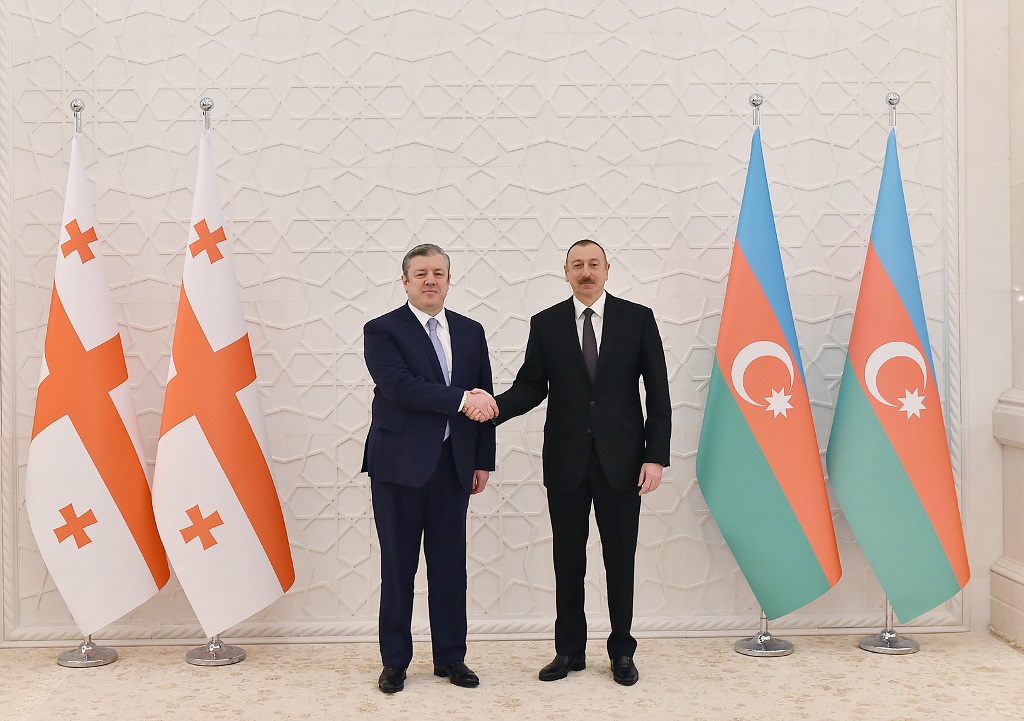Georgian Prime Minister Giorgi Kvirikashvili’s one-day visit to neighboring Azerbaijan highlighted positive bilateral cooperation between the two South Caucasus countries, including joint efforts to carry out major transportation and energy projects in the region.
“There are a number of important global projects that bind us,” Azerbaijan President Ilham Aliyev said in a meeting with Kvirikashvili in Baku on Monday, according to the official website of the president.
“One of them – the Baku-Tbilisi-Kars – we inaugurated together with you last October,” he said, referring to a railway that links Azerbaijan to eastern Turkey, via Georgia. “Our cooperation will reach a higher level thanks to the launch of the South Caucasus gas pipeline and TANAP project this year. That is, our cooperation is going beyond a regional format to reach the global level.”
The railway is just one of two big projects that have been kick-started in recent years, the other being the construction of the mega-natural gas pipeline known as the Southern Gas Corridor. Similar to the railway, the pipeline cuts through Azerbaijan and Georgia before reaching eastern Turkey.
Kvirikashvili was last in Baku on October 30, when he attended a ceremony to launch the BTK railway, a route that ultimately enables broader access to Europe for the two South Caucasus countries.
Both Azerbaijan and Georgia aim to leverage transport network in the region and team up to act as a bridge for the emerging Asia-Europe transportation and trade corridor.
Georgia’s government is calling the BTK railway a game changer in the economic life of the country. Connecting China, Kazakhstan, Azerbaijan, Turkey and Europe to Georgia within just nine days has been hailed as a great achievement, which expects to collect transit fees for cargo passing through its territory.
Georgia took out $770 million in loans from Azerbaijan to finance the 263-kilometer Tbilisi-Ahalkalaki-Kars segment of the railway, while Azerbaijan allocated over $642 million to the 504-kilometer chunk of the 849-kilometer railroad via its State Oil Fund.
“The Baku-Tbilisi-Kars railway and Southern Gas Corridor projects are of great significance,” Kvirikashvili said in a meeting with President Aliyev.
“Azerbaijani gas will then be transported to Europe via the Trans-Anatolian and Trans-Adriatic pipelines, which are the segments of the Southern Gas Corridor. These projects are very important from economic and geopolitical points of view,” he added.
The corridor will stretch 3,500 kilometers across Azerbaijan, Georgia, Turkey, Greece and Albania before finally ending in southern Italy. Segments of the corridor will go online later this year, while the entire project will be operational by 2020.
The 691-kilometer segment bridging Azerbaijan and Georgia is known as the South Caucasus Pipeline, will transport gas from the Sangachal terminal near Baku, to Georgia and Turkey.
The expansion of this segment has required the construction of a new pipeline across Azerbaijan, and the installation of two new compressor stations in Georgia, helping to triple the projected annual gas supplied through the corridor to over 20 billion cubic meters per year.
At the border of Georgia and Turkey, the South Caucasus Pipeline will link into the Trans Anatolian Pipeline (TANAP), the middle segment of the corridor, which will traverse the entire length of Turkey horizontally before connecting to the Trans Adriatic Pipeline (TAP) at Turkey’s border with Greece.
But gas isn’t the only form of energy cooperation between the two neighboring countries.
Azerbaijan supplies crude oil from its undersea Azeri-Chirag-Gunashli field in the Caspian Sea to Georgia and further to the Mediterranean Sea region, via the 1,768-kilometer Baku-Tbilisi-Ceyhan pipeline. The Baku-Supsa oil pipeline also carries crude oil from Azerbaijan to terminals in the Black Sea coastal city of Supsa, which then makes its way to European markets.







 Russian Foreign Minister Sergei Lavrov has reasserted that Moscow has no intentions to stop the fighting in Ukraine, even if peace talks commence.
Russian Foreign Minister Sergei Lavrov has reasserted that Moscow has no intentions to stop the fighting in Ukraine, even if peace talks commence.
 Iran has refuted reports of alleged damage to Shimon Peres Negev Nuclear Research Centre located southeast of Dimona, Israel, during the recent air...
Iran has refuted reports of alleged damage to Shimon Peres Negev Nuclear Research Centre located southeast of Dimona, Israel, during the recent air...
 Iran’s Foreign Minister, Hossein Amir-Abdollahian, has labeled a foiled Israeli drone attack in certain parts of the country as a "failure" for Isr...
Iran’s Foreign Minister, Hossein Amir-Abdollahian, has labeled a foiled Israeli drone attack in certain parts of the country as a "failure" for Isr...



